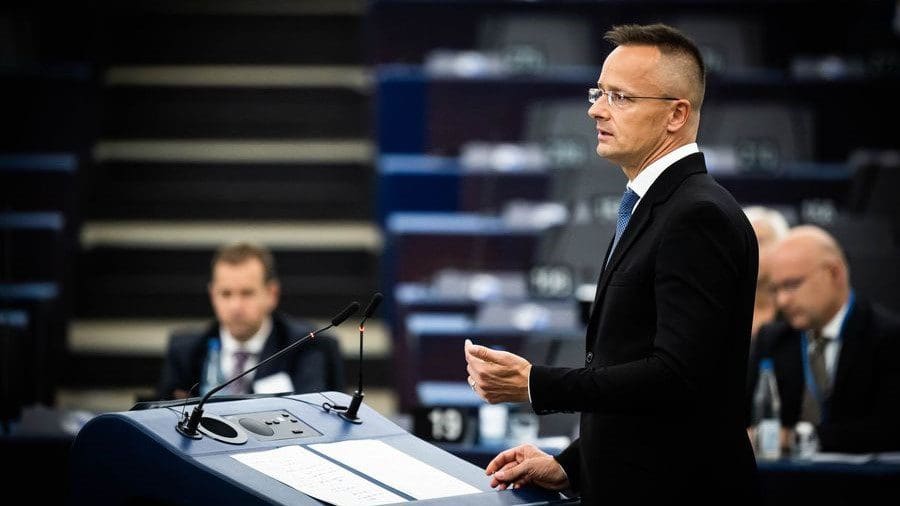The Hungarian government completed its homework regarding Sweden’s NATO accession request long ago, as it submitted the Swedish ratification document to the National Assembly last year. The opportunity for a vote on the matter will arise during the autumn plenary session starting in September, Minister of Foreign Affairs and Trade Péter Szijjártó shared in an interview with Turkish television channel TRT World.
He emphasised that the contentious issues with Stockholm have not yet been resolved and stated that it is regrettable that Hungary has become a target and victim of an international political discourse shaped by ‘criticisms and judgments’ that interfere with Hungarian domestic politics. The government does not intend to hinder Sweden’s NATO membership, he stressed, noting that he has been in continuous consultation with Turkish leaders regarding both the Swedish and earlier, the Finnish NATO accession requests. Most recently, during Recep Tayyip Erdoğan’s visit to Budapest on 20 August, this matter was discussed. Additionally, Szijjártó frequently engages with his Turkish counterpart, Hakan Fidan, on this issue.
As a NATO ally, Hungary takes into account Turkey’s interests and viewpoints,
as military-defence alliances must be built on trust, the minister emphasised.
Regarding the Ukrainian conflict, Szijjártó stated that, as a neighbouring country, Hungary is in a unique position due to the large Hungarian diaspora in Transcarpathia. Many members of this Hungarian community were conscripted into the Ukrainian army as Ukrainian citizens, and many of them lost their lives in the war. Therefore, Hungary calls for an immediate ceasefire and prompt peace negotiations, refrains from supplying weapons, and does not allow weapons to transit through its territory. The minister stressed that the sooner the war ends, the fewer Ukrainian and Hungarian Ukrainian lives will be lost.
He affirmed that Hungary itself had to fight for its freedom and independence throughout history, so it firmly and unconditionally respects Ukraine’s territorial integrity and sovereignty. Similarly, Hungary unconditionally supports the more than one million Ukrainian refugees who have arrived in Hungary. Over 1,300 Hungarian kindergartens and schools have welcomed Ukrainian children; the government provides healthcare to refugees, and it strives to offer employment opportunities and a relatively normal life for the often separated families, as the men remained in Ukraine to fight, the minister listed. Accordingly,
Hungary expects Ukraine to restore and ensure the minority rights of its Hungarian community
which were in place until 2015: rights concerning language use, cultural activities, and official procedures. The minority rights of the Hungarian community in Transcarpathia are much more restricted today than in 2015, which is unacceptable, the minister emphasised. He added that if Ukraine intends to join the European Union, it must accept the common EU values and ensure national minority rights.
Concerning the ban on Ukrainian grain imports to Hungary, Szijjártó highlighted that he regretfully acknowledged Russia’s termination of the Black Sea grain export agreement, despite the efforts of Turkey and President Erdoğan to maintain the agreement. Hungary has kept the solidarity corridors open to provide African and Middle Eastern countries with access to the necessary Ukrainian grain. Nevertheless, a portion of Ukrainian grain did not reach these countries but remained in Hungary. while the Hungarian government continues to secure the transit route for Ukrainian grain exports, the large quantity of cheap Ukrainian grain delivered to Hungary could disrupt the Hungarian market and harm Hungarian farmers.
Regarding Hungary’s energy security, the minister highlighted the significance of Turkey and the Trans-Anatolian Natural Gas Pipeline. He emphasised that Hungary assisted in building the Turkish Stream pipeline together with Turkey, Russia, Bulgaria, and Serbia. Currently, Hungary could receive up to 8.5 billion cubic metres of natural gas through this route.
At the same time, he stressed that the government had begun energy diversification long before the Ukrainian conflict. Besides Russia, Turkey, Azerbaijan, and Qatar will be key players in Hungary’s energy mix. As per the recent agreement with Turkey’s Botas,
around 300 million cubic metres of Turkish natural gas will arrive in Hungary next year.
This will mark the first occasion when Turkey becomes not only a transit but also a source country.
As Qatar has already pre-sold its entire gas production until 2026, Hungary can purchase Qatari natural gas from 2027. The intent is there, and negotiations have commenced with Qatargas LNG. Szijjártó explained that significant regional infrastructural investments would be necessary for the delivery of Azerbaijani and Qatari natural gas, but Brussels has failed to provide the required support. So countries in the region—Slovakia, Hungary, Romania, Serbia, Bulgaria, Greece, and Turkey—have engaged in direct negotiations for the necessary capacity development investments to enable substantial gas delivery to these countries, Szijjártó explained.
Related articles:








